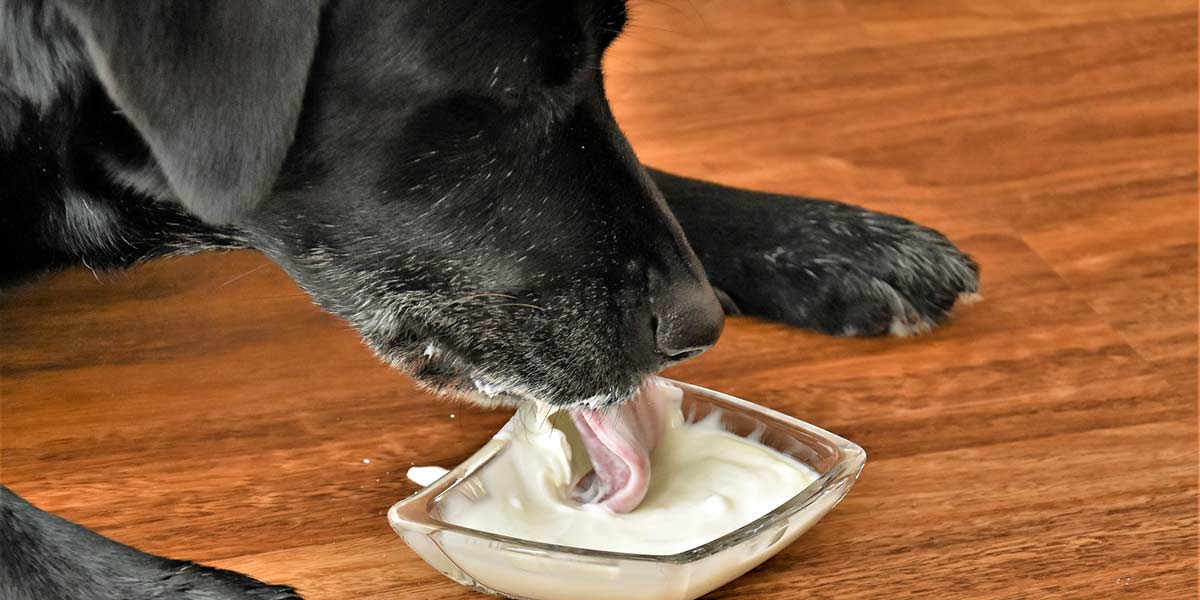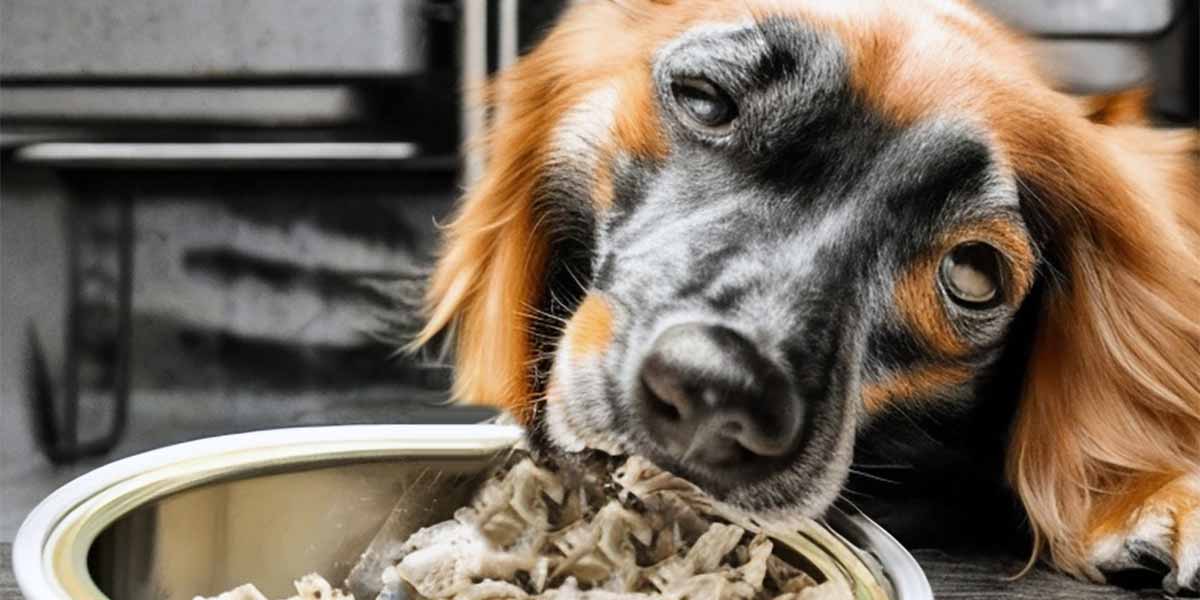Can I feed my dog yogurt? Well, I’ve got some great news for you! In this blog post, we’re going to delve into the question of whether or not it’s safe to feed your dog yogurt. So, grab a cup of tea and get ready to uncover the truth about this creamy delight and how it may or may not benefit your beloved canine companion. Let’s dive right in, shall we?
As an affiliate, we earn from qualifying purchases. We get commissions for purchases made through links in this website’s posts from Amazon and other third parties.
Can I feed my dog yogurt?
Yes, feeding your dog yogurt can be a healthy addition to their diet if given in moderation and not be the dog’s main food. When introducing yogurt to your dog’s diet, start with small amounts and observe how they react.
Some dogs may experience digestive upset, such as diarrhea or gas when first trying yogurt. If your dog shows any signs of discomfort, discontinue feeding yogurt and consult your veterinarian.
Yogurt can be served to your dog in various ways. You can mix a small amount of yogurt into their regular food as a tasty topping, or you can freeze yogurt in ice cube trays for a refreshing treat on a hot day.
Just remember that yogurt should be given as an occasional treat and not as a substitute for a balanced diet.
5 Best Natural Probiotics For Dogs Skins Allergies Video:
Key takeaways
- Dogs can eat yogurt, but it should be given in moderation and without any additives like sugar or artificial flavors, as these can be harmful to your furry friend’s health.
- Yogurt can be a healthy treat for dogs as it contains probiotics that can aid in digestion and boost their immune system.
- Always check with your veterinarian before incorporating yogurt into your dog’s diet, especially if they have any underlying health conditions or are on medication.
- Introduce yogurt slowly to your dog’s diet to ensure they have no adverse reactions such as stomach upset or diarrhea. Start with small quantities and observe their reaction before raising the serving amount.
- Avoid giving your dog flavored yogurt, as they often contain added sugar or artificial sweeteners, both of which can be potentially harmful to your dog. Stick to plain, low-fat yogurt to ensure that your pup is getting the most health benefits.
Ask A Vet: Can I give my dog yogurt? Video:
Benefits of feeding your dog yogurt
Yogurt isn’t just a delicious, creamy treat for humans, it can also be a fantastic addition to your dog’s diet!
Benefit from the probiotics and calcium in yogurt
Packed with probiotics, yogurt helps promote healthy digestion in dogs, just like it does in us.
These beneficial bacteria aid in the absorption of nutrients and support a strong immune system for our furry friends. Plus, yogurt is a great natural source of calcium, essential for developing and maintaining strong bones and teeth.
Adding a small amount of yogurt to your dog’s daily meals can be a wonderful way to support their overall health and well-being. Whether you have a puppy growing rapidly or a senior dog who needs some extra joint support, the calcium in yogurt can be incredibly beneficial.
And the best part? Dogs absolutely love the taste! So, not only will they be enjoying a tasty treat, but they’ll also be reaping the rewards of the probiotics and calcium that yogurt provides.
Remember, though, moderation is key when it comes to feeding your dog yogurt. While yogurt itself can be a healthy addition to their diet, it’s important to choose plain, unsweetened varieties without any additives, artificial sweeteners, or flavors.
Additionally, some dogs may be lactose intolerant, so it’s important to introduce yogurt slowly into their diet and observe any negative reactions. Always consult with your veterinarian before making any major changes to your dog’s diet to ensure it’s the right choice for them.
Benefits from yogurt can also include improved digestion & strengthened bones
Feeding your furry friend a wholesome, balanced diet is crucial for their overall health and well-being. And if you’ve ever wondered about adding yogurt to your dog’s meal plan, we have some great news for you! Not only is yogurt safe for dogs to consume, but it also comes with a myriad of benefits that can enhance their digestion and strengthen their bones.

One significant advantage of incorporating yogurt into your dog’s diet is improved digestion. Dogs’ intestinal health can be supported by the probiotic bacteria found in yogurt. These probiotics work by aiding in the digestion and absorption of nutrients, which can ultimately lead to better overall digestion.
So, if your dog occasionally suffers from an upset stomach or irregular bowel movements, a little bit of yogurt can work wonders in restoring the balance in their digestive system.
Another fantastic benefit of yogurt for dogs is the potential to strengthen their bones. Yogurt is an excellent source of calcium, a crucial mineral that contributes to bone health and development.
By providing your canine companion with a small serving of yogurt, you can rest assured knowing that their bones receive essential nutrients to support their growth and overall skeletal strength. Plus, this can be especially beneficial for older dogs or breeds prone to bone-related issues, such as arthritis.
So, if you’ve been wondering whether you can add yogurt to your dog’s diet, the answer is a resounding yes! Not only is it safe for them to enjoy, but your furry friend can also reap the rewards of improved digestion and strengthened bones.
Just remember to choose plain or unsweetened yogurt to avoid any additional sugars that might not agree with your pup’s tummy. With a little bit of yogurt added to their diet, your dog will continue to wag their tail with joy and remain healthy for years.
Avoid flavored, sweetened, and sugary yogurts
One important tip is to avoid flavored, sweetened, and sugary yogurts. While these may be tempting for your pup, they can actually be harmful to their health. Opt for plain yogurt instead, which is packed with probiotics and protein that can benefit your dog’s digestion and overall well-being.
When it comes to choosing the right yogurt for your dog, simplicity is key. Flavored yogurts often contain artificial additives and high amounts of sugar, which can lead to weight gain and potential dental issues. These can be harmful to your dog’s health and may cause digestive upset. Instead, reach for unsweetened, plain yogurt, which provides a tasty yet nutritious treat for your furry friend.
It’s best to opt for yogurt that is free from any added sugars or artificial sweeteners.
Check ingredients for artificial sweeteners or additives
There are a few things to keep in mind before sharing your yogurt with your dog.
First and foremost, it’s important to check the ingredients of the yogurt before feeding it to your dog. Some yogurts contain artificial sweeteners or additives that can be harmful to dogs. Xylitol, a common sweetener, can cause a sudden release of insulin in dogs, leading to low blood sugar levels and potentially life-threatening consequences. Stick to plain, unsweetened yogurt to ensure your dog’s safety.
Secondly, while yogurt is generally safe for dogs, some may be lactose intolerant. Just like humans, dogs can have difficulty digesting lactose, the sugar found in milk products. If your dog experiences any digestive upset, such as diarrhea or gas, after eating yogurt, it may be best to avoid it in the future or try lactose-free alternatives.
Lastly, moderation is key. While yogurt can be a great source of probiotics, protein, and calcium for dogs, it should only be given as an occasional treat. Too much yogurt can lead to weight gain or upset stomachs. A small spoonful or two, a couple of times a week, is a good rule of thumb.

Risks of feeding yogurt to your dog
While yogurt is generally considered a healthy food for humans, it can pose risks when given to dogs. The main concern is that many types of yogurt contain high amounts of sugar, which can lead to weight gain and dental problems in dogs.
Lactose intolerance in dogs
Some dogs may be lactose intolerant and have trouble digesting dairy products like yogurt. So, it’s important to note that not all dogs can tolerate dairy products, which means some dogs cannot properly digest lactose, the sugar found in milk. Digestive disturbances including diarrhea and vomiting may result from this.
Added sugars and artificial sweeteners
Some brands of yogurt contain added sugars or artificial sweeteners such as xylitol, which can be toxic to dogs. In dogs, xylitol can result in a quick insulin release that causes hypoglycemia (low blood sugar). Dogs who have consumed much xylitol may vomit, become uncoordinated, develop liver failure, or have seizures. Therefore, it is important to read the label carefully and avoid feeding yogurt that contains added sugars or artificial sweeteners.
Dairy allergies in dogs
Some dogs may be allergic to dairy products, including yogurt. Dairy allergies in dogs can cause symptoms such as itching, hives, and digestive issues. If your dog has a known dairy allergy, it is best to avoid feeding them yogurt altogether.
In conclusion, while yogurt can provide some benefits to dogs, it is important to be aware of the potential risks associated with feeding it to them. It is recommended to consult with a veterinarian before introducing any new food to your dog’s diet, including yogurt.
If your dog has never had yogurt before, and your veterinarian is okay with feeding it yogurt, start with a small amount and monitor it closely for any adverse reactions.
Which is the best yogurt to feed my dog?
The best yogurt for feeding your dog is the one that has lots of live cultures. The Greek-style plain yogurt can be perfect for your dog. The reason is that the lactose level is very low compared to regular yogurt.
How much yogurt should I feed my dog?
A good rule of thumb is to limit your dog’s yogurt intake to one to two tablespoons per day, depending on their size.
Final words
The question “Can I feed my dog yogurt?” may appear innocuous at first glance, but its significance cannot be underestimated.
As pet parents, we are responsible for ensuring our pets’ well-being. Exploring alternative food options, such as yogurt, can open new doors to providing a diverse and nutritious diet for our dogs.
So, the next time you find yourself in the dairy aisle, take a moment to reflect on the importance of seeking the best for your four-legged friend. Remember, every decision you make for their health contributes to a lifetime of happiness and vitality for your beloved companion.






